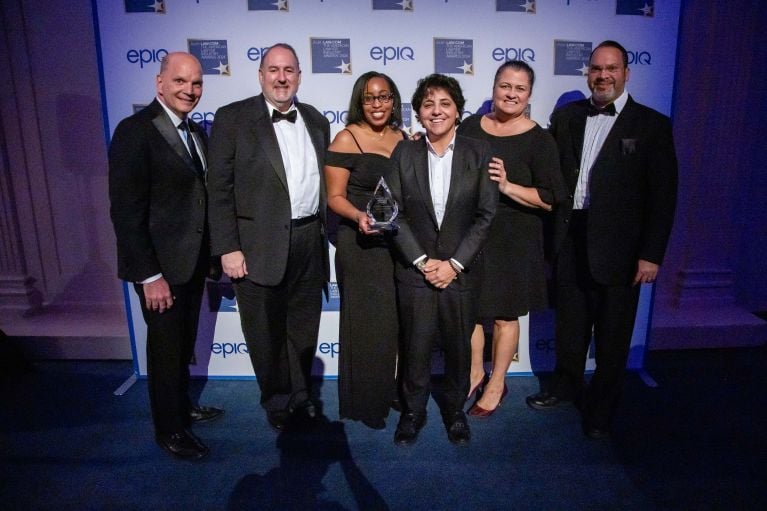 Antony Phillipson. Photo: Christopher Goodney/Bloomberg
Antony Phillipson. Photo: Christopher Goodney/BloombergBritish Diplomat Talks Post-Brexit Free Trade Agreements With US, EU
"I believe there is an imperative for the U.K. and the U.S. to get back to having a conversation about the type of global economy in which we want to operate," said British Consul General Antony Phillipson.
February 07, 2020 at 02:22 PM
3 minute read
The U.K. has parted ways with the European Union and British diplomat Antony Phillipson isn't wasting time looking in the rearview mirror.
"We have done Brexit. We have left the EU. Now we're engaged in the process of our future relationship with the EU, our future relationship with the U.S., our future relationship with the rest of the global economy," he said.
Phillipson, the British Consul General in New York and Her Majesty's Trade Commissioner for North America, spoke Thursday in Raleigh, North Carolina, during a panel discussion that Womble Bond Dickinson sponsored.
Asked if he believed the U.K. and EU could finalize a trade deal before the Brexit transition period ends Dec. 31, Phillipson deadpanned, "Yes," drawing laughter from the audience.
"I'm very confident that it will be done," he continued. "I think there is an imperative on both sides to get that done. … We know what we want to do. … We just have to get on and do it."
The U.K.'s goal is to reach a free trade agreement with the EU with "zero tariffs, zero quotas on trading goods," according to Phillipson.
He also stressed that the U.K. is "absolutely determined to deepen and strengthen" its economic relationship with the U.S., noting that the U.S. is the U.K.'s largest export market. The U.S. receives 18-20% of the U.K.'s exports in any given year, according to Phillipson.
"I believe there is an imperative for the U.K. and the U.S. to get back to having a conversation about the type of global economy in which we want to operate," he said. "It's not just us. I would like to include in that the likes of Canada, South Korea, Japan, Singapore, Australia and a number of the European member states."
When an audience member asked how much the U.K. was willing to sacrifice in order to secure a trade agreement with the U.S., Phillipson replied: "I think sacrifice is the wrong word."
"We've watched very carefully what the U.S. has done both through [North American Free Trade Agreement] and the renegotiation to [United States-Mexico-Canada Agreement]," he said, referring to the new trade agreement between the U.S., Mexico and Canada.
"Trade agreements are about give and take. They are about reaching mutual agreements on mutual benefit. And so I think sacrifice is the wrong word. If you make it a sacrifice I think you automatically create sort of a sense of resistance to the deal," he added.
Phillipson later acknowledged that the U.K. is "acutely aware of the political dynamics" surrounding trade issues and stressed that crafting an agreement that is unlikely to receive support on both sides of the Atlantic would be pointless.
If opposing parties maintain control of the U.S. House and Senate "and we can't keep some support from both sides of the aisle for what we end up negotiating with the U.S., we're going to have a problem," he said.
This content has been archived. It is available through our partners, LexisNexis® and Bloomberg Law.
To view this content, please continue to their sites.
Not a Lexis Subscriber?
Subscribe Now
Not a Bloomberg Law Subscriber?
Subscribe Now
NOT FOR REPRINT
© 2024 ALM Global, LLC, All Rights Reserved. Request academic re-use from www.copyright.com. All other uses, submit a request to [email protected]. For more information visit Asset & Logo Licensing.
You Might Like
View All
Digging Deep to Mitigate Risk in Lithium Mine Venture Wins GM Legal Department of the Year Award
5 minute read
Elaine Darr Brings Transformation and Value to DHL's Business

PepsiCo's Legal Team Champions Diversity, Wellness, and Mentorship to Shape a Thriving Corporate Culture
Law Firms Mentioned
Trending Stories
- 1Judge Denies Sean Combs Third Bail Bid, Citing Community Safety
- 2Republican FTC Commissioner: 'The Time for Rulemaking by the Biden-Harris FTC Is Over'
- 3NY Appellate Panel Cites Student's Disciplinary History While Sending Negligence Claim Against School District to Trial
- 4A Meta DIG and Its Nvidia Implications
- 5Deception or Coercion? California Supreme Court Grants Review in Jailhouse Confession Case
Who Got The Work
Michael G. Bongiorno, Andrew Scott Dulberg and Elizabeth E. Driscoll from Wilmer Cutler Pickering Hale and Dorr have stepped in to represent Symbotic Inc., an A.I.-enabled technology platform that focuses on increasing supply chain efficiency, and other defendants in a pending shareholder derivative lawsuit. The case, filed Oct. 2 in Massachusetts District Court by the Brown Law Firm on behalf of Stephen Austen, accuses certain officers and directors of misleading investors in regard to Symbotic's potential for margin growth by failing to disclose that the company was not equipped to timely deploy its systems or manage expenses through project delays. The case, assigned to U.S. District Judge Nathaniel M. Gorton, is 1:24-cv-12522, Austen v. Cohen et al.
Who Got The Work
Edmund Polubinski and Marie Killmond of Davis Polk & Wardwell have entered appearances for data platform software development company MongoDB and other defendants in a pending shareholder derivative lawsuit. The action, filed Oct. 7 in New York Southern District Court by the Brown Law Firm, accuses the company's directors and/or officers of falsely expressing confidence in the company’s restructuring of its sales incentive plan and downplaying the severity of decreases in its upfront commitments. The case is 1:24-cv-07594, Roy v. Ittycheria et al.
Who Got The Work
Amy O. Bruchs and Kurt F. Ellison of Michael Best & Friedrich have entered appearances for Epic Systems Corp. in a pending employment discrimination lawsuit. The suit was filed Sept. 7 in Wisconsin Western District Court by Levine Eisberner LLC and Siri & Glimstad on behalf of a project manager who claims that he was wrongfully terminated after applying for a religious exemption to the defendant's COVID-19 vaccine mandate. The case, assigned to U.S. Magistrate Judge Anita Marie Boor, is 3:24-cv-00630, Secker, Nathan v. Epic Systems Corporation.
Who Got The Work
David X. Sullivan, Thomas J. Finn and Gregory A. Hall from McCarter & English have entered appearances for Sunrun Installation Services in a pending civil rights lawsuit. The complaint was filed Sept. 4 in Connecticut District Court by attorney Robert M. Berke on behalf of former employee George Edward Steins, who was arrested and charged with employing an unregistered home improvement salesperson. The complaint alleges that had Sunrun informed the Connecticut Department of Consumer Protection that the plaintiff's employment had ended in 2017 and that he no longer held Sunrun's home improvement contractor license, he would not have been hit with charges, which were dismissed in May 2024. The case, assigned to U.S. District Judge Jeffrey A. Meyer, is 3:24-cv-01423, Steins v. Sunrun, Inc. et al.
Who Got The Work
Greenberg Traurig shareholder Joshua L. Raskin has entered an appearance for boohoo.com UK Ltd. in a pending patent infringement lawsuit. The suit, filed Sept. 3 in Texas Eastern District Court by Rozier Hardt McDonough on behalf of Alto Dynamics, asserts five patents related to an online shopping platform. The case, assigned to U.S. District Judge Rodney Gilstrap, is 2:24-cv-00719, Alto Dynamics, LLC v. boohoo.com UK Limited.
Featured Firms
Law Offices of Gary Martin Hays & Associates, P.C.
(470) 294-1674
Law Offices of Mark E. Salomone
(857) 444-6468
Smith & Hassler
(713) 739-1250







